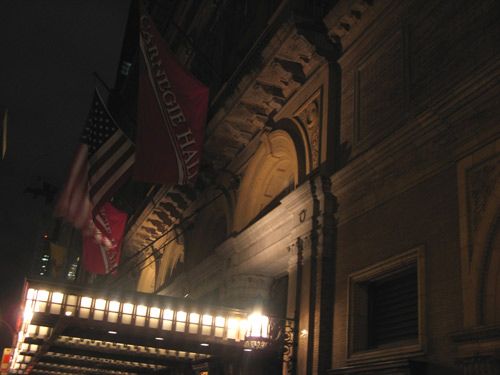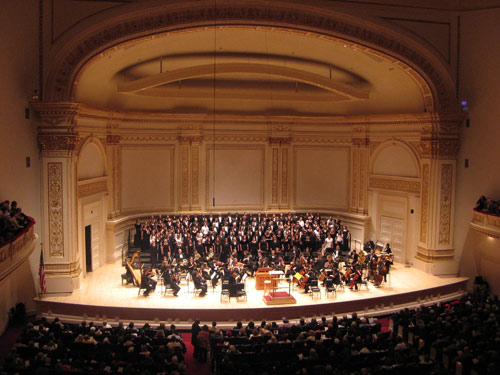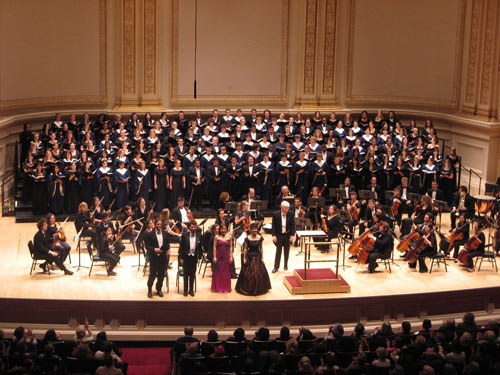Tag: Chorus
New England Symphonic Ensemble
At Carnegie Hall – not Lincoln Center, ahem! — for the New England Symphonic Ensemble program. It was an all choral line-up tonight, featuring Mozart’s Requiem, K. 626 as the highlight finale.

We had seats in the second tier center box, which was a perfect perch from which to take in the entire stage with its orchestra and hundreds of chorus members from five states. To start things off: George Frideric Handel’s “Sing Unto God” from his Judas Maccabeus, an oratorio written in 1746 — five years after Messiah. And then before the intermission break, Ralph Vaughan Williams’ Serenade to Music, which culls its lines from Act V of Shakespeare’s Merchant of Venice:
The man that hath no music in himself,/ Nor is not mov’d with concord of sweet sounds,/ Is fit for treasons, stratagems, and spoils;/ The motions of his spirit are dull as night,/ And his affections darks as Erebus:/ Let no such man be trusted.

One distraction: although the program clearly requested that audience members hold their applause until after the final movement, we would invariably have to pause for the smatterings of claps at every break. Eh, whaddaya gonna do?
For the Requiem in D minor, a new set of choruses took the stage, many clad in navy choir robes. Mozart’s last composition is one of his most widely recognized works, not only for its music (which HYB posited as the only proof of the existence of God), but also for the mysterious circumstances surrounding the Requiem‘s commission, the debate over how much of the score is attributable to Mozart, and how much was later composed by his colleague Franz Xaver Süssmayr after Mozart’s death.
My first exposure to the score was in Amadeus. (Years later, though, my high school chorus learned excerpts of it for performance, including the rousing “Dies Irae“. And as I recall, the “Lacrimosa” was one of SS’s all-time favorite pieces of music.) That film went on to win eight Academy Awards, including best picture, and is responsible for cementing in many people’s minds several of the myths surrounding the Requiem (and of Mozart’s life, generally.) Foremost among these is the role of rival composer Antonio Salieri in commissioning the work, and ultimately hastening Mozart’s death.

As I sat listening to the eminently moving music, it occurred to me that Amadeus, which recently played in New York as part of the Milos Forman retrospective at the MoMA, was released in 1984 — which is to say: before most of the members of these high school and college chorus members were even born.
Falco’s “Rock Me Amadeus” was released the following year, in 1985.
| S | M | T | W | T | F | S |
|---|---|---|---|---|---|---|
| 1 | 2 | |||||
| 3 | 4 | 5 | 6 | 7 | 8 | 9 |
| 10 | 11 | 12 | 13 | 14 | 15 | 16 |
| 17 | 18 | 19 | 20 | 21 | 22 | 23 |
| 24 | 25 | 26 | 27 | 28 | 29 | 30 |
Search
Popular Tags
Categories
Archive
- July 2010
- July 2009
- January 2009
- November 2008
- September 2008
- August 2008
- July 2008
- June 2008
- May 2008
- April 2008
- March 2008
- February 2008
- January 2008
- December 2007
- November 2007
- October 2007
- September 2007
- August 2007
- July 2007
- June 2007
- May 2007
- April 2007
- March 2007
- February 2007
- January 2007
- December 2006
- November 2006
- October 2006
- September 2006
- August 2006
- July 2006
- June 2006